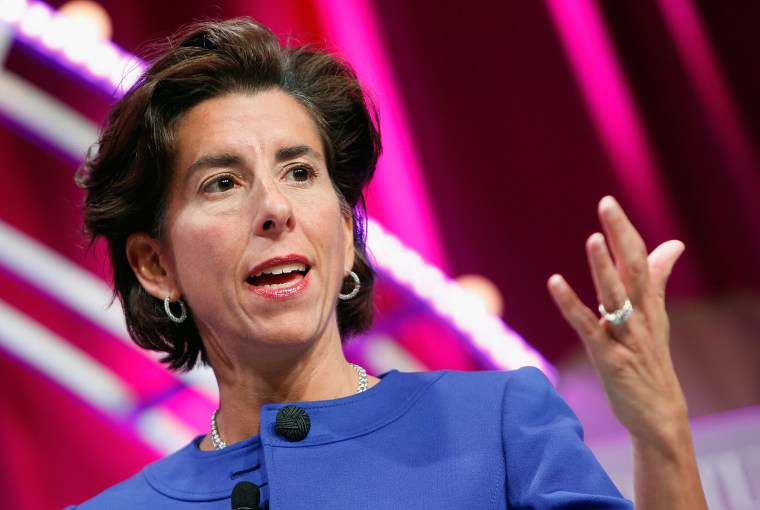“Getting Americans back to work,” is job number one, Secretary of Commerce Gina Raimondo told NBC News’ Stephanie Ruhle in an exclusive interview.
The former Rhode Island governor was sworn in by Vice President Kamala Harris on Wednesday night. In her new cabinet position, answering directly to President Joe Biden, Raimondo will oversee an $8 billion budget and the work of over 43,000 employees under a broad umbrella of activities. Among its duties, the Commerce Department oversees trade and regulations, patents, the Census, and the National Weather Service.
Promoting job creation and economic growth are the two main roles of the Commerce.
Getting there will take bold work on several fronts, Raimondo said, from keeping some of former President Donald Trump’s tariffs on China, bringing American manufacturing back, revamping job training, expanding broadband access, and supporting the $1.9 trillion American Rescue Plan stimulus package.
Even though raising the federal minimum wage was stripped from the relief package bill in a concession to Republicans and some moderate Democrats, getting the legislation passed is a top priority for Biden, Raimondo said.
“Good business is raising [up] the American worker,” said Raimondo, a Rhodes Scholar and Yale Law School graduate who worked in venture capital before entering politics. “Getting to $15 an hour minimum wage.”
“It is not right for folks to work full time and be in poverty,” she said. “We need to reward work. Work should have dignity. And that means work has to pay.”
As governor, Raimondo initiated new workforce retraining programs aligned with specific employer needs, making sure the education was a pipeline to real and ready jobs and used targeted grants to reach populations with employment barriers. Now, the question is whether she can scale the same approach nationally.
“There's a huge opportunity to lift Americans to higher paying jobs, with better training.”
“You can't train and pray folks get a job. Business has to come to the table, help us create training programs, and then commit to hiring,” Raimondo said. “There's a huge opportunity to lift Americans to higher paying jobs with better training.”
That success in creating public-private partnerships, drawing upon her roles in both sectors, has provided her with both the experience and template for a path forward for an economy that works for both capital and labor.
"One of the things about this job that's so exciting to me is bringing business to the table in partnership to solve some of our biggest problems, whether that's broadband, job training, investments in infrastructure or technology," Raimondo said.
"It's time for everybody to lean in to solve these big problems," she said. "I have a track record of working with business, and I'm going to hold them accountable to play their part because when they do, we all win. When done properly, business can be a force for good."
Besides promoting the nation’s domestic economic growth, the new Commerce Secretary will also be responsible for protecting its international economic interests: Raimondo inherits the trade war with China started by Trump and given teeth by her predecessor, Wilbur Ross, who employed a novel interpretation of American trade law to make the recommendations to impose tariffs on imported steel and aluminum from most countries, including China. The department also provided the recommendations that led to the imposing of tariffs on billions of Chinese goods.
But having gained a bargaining chip against China, the Biden administration isn’t going to toss it away.
“China's behavior is anti-competitive, coercive. Their human rights abuses are horrific, and they need to be held to account for that,” as well as for dumping “excessive amounts of cheap steel and aluminum into America,” Raimondo said.
"When done properly, business can be a force for good."
The tariffs have been “effective,” she said, noting that the administration intends for a top-to-bottom review of previous policies to “decide what it makes sense to maintain.”
During her Senate confirmation hearing, Raimondo initially declined to commit to keeping Chinese telecommunications firm Huawei on the Commerce Department’s Entity List, a blacklist that prohibits U.S. firms from doing business with hostile foreign companies.
Later, she said she would keep Huawei and other firms on the list for now. She was confirmed 84-15.
“If you look at their behavior, they deserve to be targeted. And if it's necessary, then that's what we'll do,” she told NBC News.
“The Entity List is a powerful tool,” she said. “Chinese telecommunications companies are a threat to American economic and national security. We're going to use [the list] to its full effect.”
But Raimondo remains focused on what can be done on these shores.
“I believe in America, I believe we can rebuild this economy, I believe we’re going to rebuild it from the bottom up,” she said.
“I’m a do-er — and I’m excited to do for the American people.”


